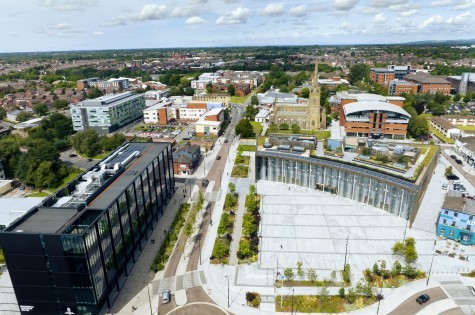It has been described as the ‘fuel of the future’. Hydrogen energy is predicted to play a key part in powering the journey towards net zero.
The future does not seem that far away as support grows for low-carbon hydrogen.
Multi-national oil and gas giant BP is among businesses pumping large-scale investment into its development, with two major UK production projects already underway.
The government believes 20-35 per cent of the nation’s energy consumption could be hydrogen-based by 2050 with the new sector supporting thousands of jobs.
Earlier this year it announced the first 15 companies to benefit from a £240m Net Zero Hydrogen Fund, set up to support its development and deployment.
It has also unveiled plans for a globally recognised low carbon hydrogen certification scheme. It says the aim is to help the growing UK green energy market to “verify sustainability claims”, while delivering industry and consumer confidence in low carbon hydrogen.
Announcing the move, energy security and net zero minister Graham Stuart said: “Consumers and businesses care about investing sustainably. Thanks to this new scheme, investors and producers will be able to confidently identify and invest in trusted, high-quality British sources of low carbon hydrogen, both home and abroad.
“I look forward to working with industry as we deliver hydrogen as a secure, low carbon replacement for fossil fuels that will help us move towards net zero, secure jobs, and boost investment.”
Jane Toogood, the government appointed ‘Hydrogen Champion’ believes the scheme is key to growing a low carbon hydrogen economy.
She adds: “Hydrogen is an essential piece of the puzzle to decarbonise UK industry, support clean growth and improve our long-term energy security.”
Hydrogen is also set to play its part in a Lancashire business’ ambitious decarbonisation and clean growth plans.
Budweiser Brewing Group, which operates the county’s biggest brewery at Samlesbury, is part of the global AB InBev group.
The brewery produced its first beer in March 1972. Today it employs around 350 staff and has the capacity to brew 295 million pints per year, making some of the nation’s most recognised beers, including Budweiser, Stella Artois and Corona.
In March it announced that it was working with leading UK green hydrogen energy services company Protium on what it calls the ‘Samlesbury Net Zero’ project.
If approved by planners, it would see a state-of-the-art ‘green hydrogen’ production facility (HPF) constructed next door to the existing brewery site, just off the A59.
Green hydrogen is created through a process called electrolysis, where electricity from renewable sources is used to split water into hydrogen and oxygen. Supporters stress there are no carbon emissions released during its production.
Once produced, the hydrogen would be fed directly to hydrogen-ready boilers allowing Budweiser to meet the thermal demand of its brewing processes, as well as its other heating requirements.
It would also include a refuelling station for use by hydrogen-ready heavy goods vehicles.
These fuel cell electric vehicles (FCEVs) only emit water vapour as they move. The heat from the HPF will also be recovered and used in Budweiser’s bottling process.
The brewery says that when operational the hydrogen production facility will save up to 11,000 tonnes of carbon dioxide each year. That is equivalent to taking 5,800 cars off the road, offsetting the emissions of 11,156 London to New York return flights, or planting 440,000 trees.
Budweiser says the project also supports the county’s wider net zero ambitions. South Ribble and the county council both have an ambition for their own operations and activities to be carbon neutral by 2030, and nationally the UK is working towards its 2050 net zero target.
If it gets the green light, the Samlesbury production plant will be operational by 2025.
Budweiser says that it will also lead to cleaner air and less noise for people living locally, with its heavy goods vehicles powered by hydrogen. Protium would fund, build, and operate the site, covering an area similar in size to one and a half full-size football pitches, for the brewery. A planning application will be submitted following local consultation.
Luiz Brandao, Budweiser’s head of procurement and sustainability, says: “Sustainability is core to our business at Budweiser Brewing Group as we work towards net zero ambitions.
“Innovative solutions like hydrogen have huge potential for reducing our carbon footprint in the UK and moving us towards our ambitious sustainability goals.”
If approved the facility will be Protium’s third HPF in the UK and its second with Budweiser.
It is also working on pioneering green hydrogen projects with businesses in other sectors where it has been previously difficult to reduce carbon emissions.
Protium describes itself as the “UK’s largest dedicated green hydrogen energy company”.
It says its ambition is to develop 1GW of green hydrogen production assets in the UK by 2030.
Chris Jackson, chief executive of Protium, says: “Samlesbury Net Zero is an investment in our environment, community, economy and our future.
“Working with the local community will be at the heart of this project.
“We want to use the local supply chain where possible and engage with the education and business communities to provide upskilling opportunities for the region in green hydrogen energy production.
“Removing carbon emissions from sectors like manufacturing is one of the biggest challenges we face in reaching net zero.
Green hydrogen is the hugely exciting next step in global energy transition, happening right here in Lancashire, to drive down these emissions and futureproof our vital industries.”
Enjoyed this? Read more from Ged Henderson





















